this sounds like a great idea, did you grow from seed? did you have to cover them or pot them first?trampled the vines a little bit, they were able to eat the tomatoes as they became ripe
Navigation
Install the app
How to install the app on iOS
Follow along with the video below to see how to install our site as a web app on your home screen.
Note: This feature may not be available in some browsers.
More options
You are using an out of date browser. It may not display this or other websites correctly.
You should upgrade or use an alternative browser.
You should upgrade or use an alternative browser.
Good bushes to plant for chickens
- Thread starter laurie9503
- Start date
Tomatoes aren't a good idea. It's a member of The nightshade family and those are poisonous to chickens. If they eat many tomatoes they will stop laying or have reduced laying.this sounds like a great idea, did you grow from seed? did you have to cover them or pot them first?
The fruit of the tomato plant are not toxic to chickens. Only the leaves.Tomatoes aren't a good idea. It's a member of The nightshade family and those are poisonous to chickens. If they eat many tomatoes they will stop laying or have reduced laying.
Everything I've ever read says the chemical is in all of the plant & it's fruit. Potatoes have it too.The fruit of the tomato plant are not toxic to chickens. Only the leaves.
My own experience was cleaning the garden out and letting them have at the excess of tomatoes and for weeks after i noticed way fewer eggs. It wasn't due to molt or fewer hrs of light. I still give them some tomatoes but very limited amounts.
AstraChick
Songster
we have quiet a few of these bushes our our property and the chooks love to scratch and dustbath under them, even the chicks love them.
Agonis flexuosa 'Nana' Dwarf Willow Myrtle. Its an Australian Beauty, not to sure where your from or if this is available where you are.

 I have planted one in our chook run. Our chook run is also our fruit tree enclosure and half of the fruit trees loose their leaves through winter so this gives them something to play in when they aren't free ranging.
I have planted one in our chook run. Our chook run is also our fruit tree enclosure and half of the fruit trees loose their leaves through winter so this gives them something to play in when they aren't free ranging.
edit: anything you plant in there, place one of those plastic covers around it so the chooks don't dig it up and it will give the roots a chance to establish.
Agonis flexuosa 'Nana' Dwarf Willow Myrtle. Its an Australian Beauty, not to sure where your from or if this is available where you are.
edit: anything you plant in there, place one of those plastic covers around it so the chooks don't dig it up and it will give the roots a chance to establish.
Everything I've ever read says the chemical is in all of the plant & it's fruit. Potatoes have it too.
My own experience was cleaning the garden out and letting them have at the excess of tomatoes and for weeks after i noticed way fewer eggs. It wasn't due to molt or fewer hrs of light. I still give them some tomatoes but very limited amounts.
The chemical is called solanine and its concentrations are high in the green parts of the plant - stems, leaves, and unripened tomatoes. The ripening process decreases the solanine levels significantly, and a fully ripe tomato has very little left - not enough to be toxic. There is no clear evidence that your drop in egg production is at all related to the tomatoes. Correlation doesn't equal causation. Ripe tomatoes are fine.
There's a lot on the internet about "nightshade" and "poison" and it can be confusing. The tomato is a member of the nightshade family, a family of plants notorious for being poisonous. That's because they contain solanine. But it's important to note that a lot of those are plants we eat today - tomatoes, potatoes, peppers, eggplants, etc. without any problems. They used to be deadly poisonous, but after centuries upon centuries of cultivation, the poison has pretty much been bred out of them to the point where we can eat them today. Even green tomatoes, which still contain more solanine than ripe red ones, are fine for humans. There's very little concern left for us nowadays - like, don't eat a green potato raw. In the process of cultivating the poison out of them for ourselves, we've done domestic animals a favor, too, by making these plants available to them as well (the ripe fruits and tubers). And they have benefitted from it, enjoying our table scraps and garden leftovers. As long as you don't feed them green, unripened fruit from the nightshade plants, I think they're going to be fine.
Here is the Texas lilac bush.
I started with this size from seeds i planted 2 years ago.
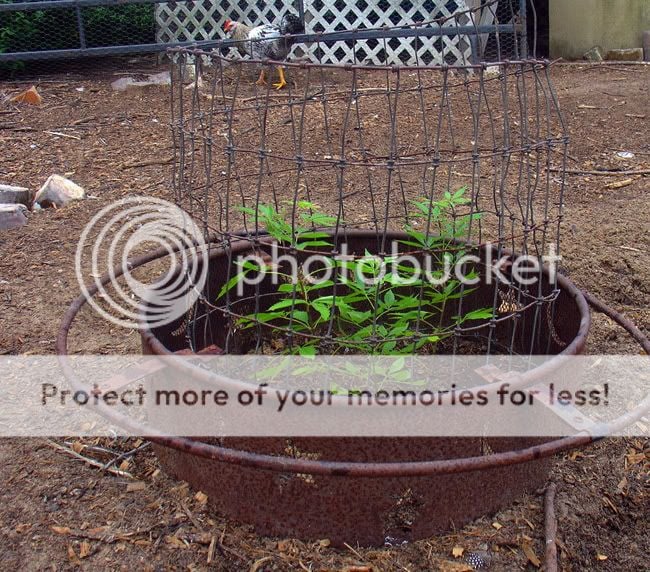
here they are now.
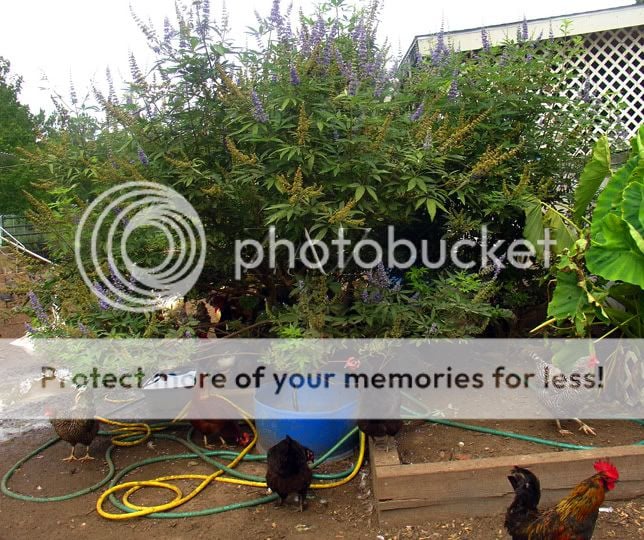
this is what it looks like under them.
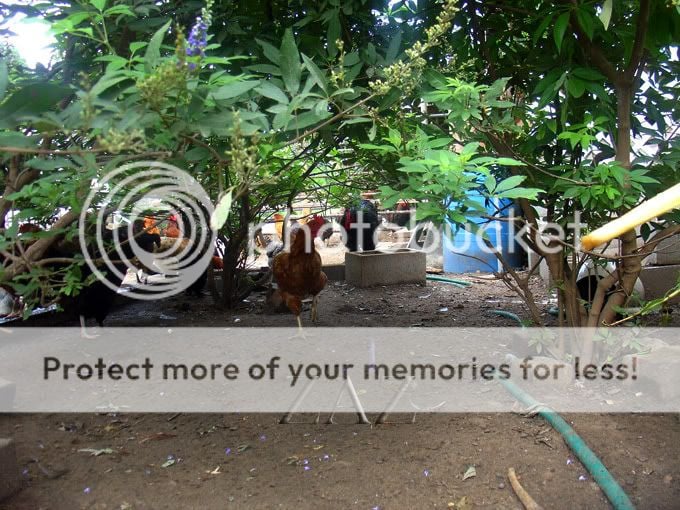
here's the pretty smelling blooms that make tons of seed that the birds just love and they are easy to grow from seeds also.
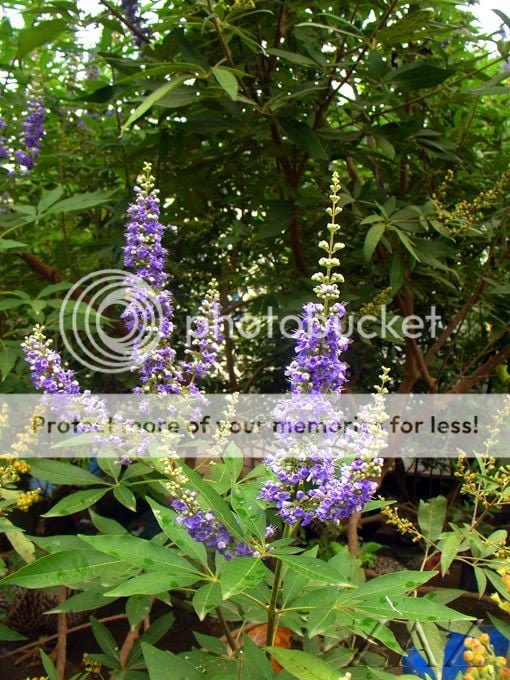
I have had chickens roost in them ,dust bathe around them ,they have been flooded with water from the chicken water, the 100 plus degree temps here does not kill them, and they grow alone or close to other lilac bushes and they still grow with no problems at all.
I planed this one last year, i though sure the young chickens all but killed it trying to roost in it but this spring it put out new growth and is doing great.
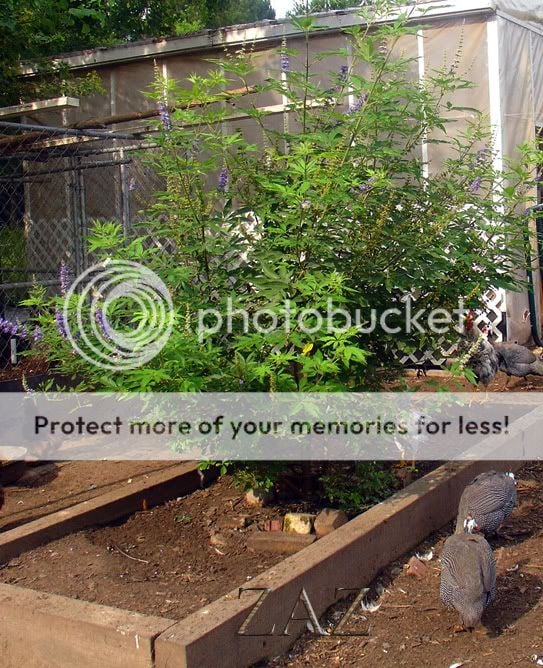
I love that bush! Seems to be a type of vitex bred in Texas. Looks hardy and beautiful.
Chickassan
RIP 1975-2022
This is an old thread but I can't get over nobody recommending blueberry bushes or scotch broom .

I've tried blueberry bushes (not in the chicken run) and always manage to kill them. Peach, persimmon, and plum trees have always done well once they were large enough the birds couldn't roost in them or reach the lowest leaves. Muscadine grape vines also worked beautifully when planted on shared fencing between breeding pens. I don't remember planting anything else on purpose in the breeding pens. I did leave yaupon holly in some pens and the chickens left it alone. The guineas murdered the shrubs left in their pen.
New posts New threads Active threads
-
Latest threads
-
Turkey Poult having trouble seeing?
- Started by amarsano
- Replies: 0
-
-
-
-
-
-
Threads with more replies in the last 15 days
-
-
-
-
Prettiest chicken breeds and plumage color
- Started by Beau plus penny
- Replies: 46
-
Question of the Day - Thursday, August 21st, 2025
- Started by casportpony
- Replies: 46
-
×


